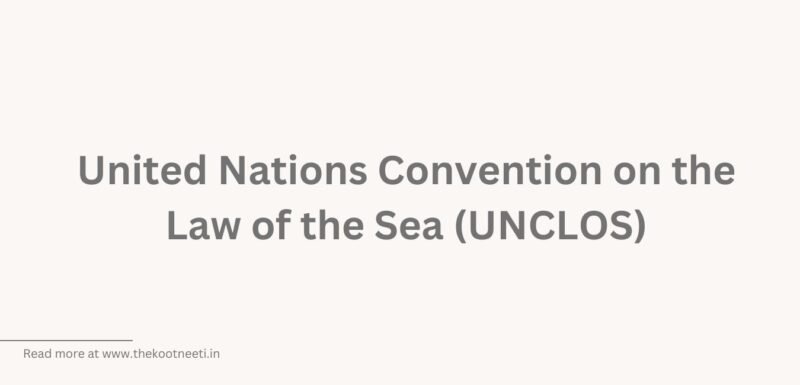United Nations Convention on the Law of the Sea (UNCLOS)

The United Nations Convention on the Law of the Sea (UNCLOS) is an international treaty that sets out the rights and obligations of states in their use of the world’s oceans. UNCLOS was adopted in 1982, and it has been ratified by more than 160 countries. The treaty is also known as the “Constitution for the Oceans” because it establishes a legal framework for the management and conservation of the world’s oceans and their resources.
UNCLOS defines the rights and responsibilities of states in relation to the use of the world’s oceans, including the rights and duties of states in the exploration and exploitation of the resources of the sea, the rights and duties of states in the protection and preservation of the marine environment, and the settlement of disputes between states concerning the use of the sea.
UNCLOS also establishes a legal regime for the areas of the sea beyond national jurisdiction, including the deep seabed, the high seas, and the polar regions. The treaty sets out rules for the exploration, exploitation, and protection of the resources of these areas, and it also establishes a system for the settlement of disputes arising from the use of these areas.
It is a widely accepted and widely ratified treaty, and it is considered to be the “constitution” of the oceans.
UNCLOS is important for a number of reasons:
- It defines the rights and responsibilities of states in relation to the use of the world’s oceans, including the rights and duties of states in the exploration and exploitation of the resources of the sea, the rights and duties of states in the protection and preservation of the marine environment, and the settlement of disputes between states concerning the use of the sea.
- It establishes a legal regime for the areas of the sea beyond national jurisdiction, including the deep seabed, the high seas, and the polar regions. The treaty sets out rules for the exploration, exploitation, and protection of the resources of these areas, and it also establishes a system for the settlement of disputes arising from the use of these areas.
- It is a widely accepted and widely ratified treaty, and it is considered to be the “constitution” of the oceans. This makes it an important reference point for the resolution of disputes and the interpretation of international law in relation to the use of the oceans.
- It plays a key role in promoting cooperation and dialogue among states on issues related to the use of the oceans, which helps to ensure the peaceful and orderly use of the oceans and the conservation of their resources.


















